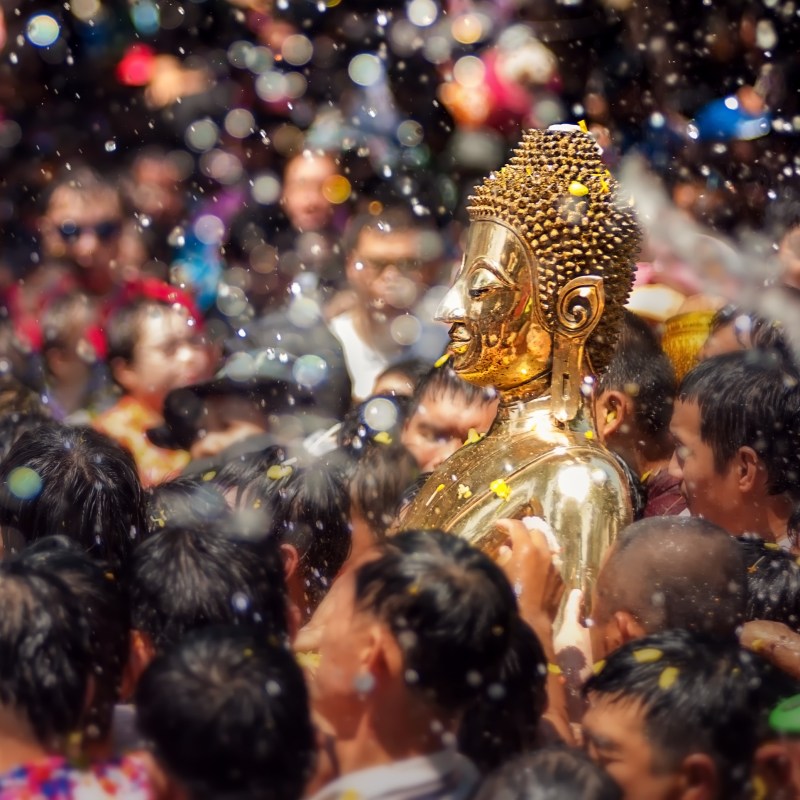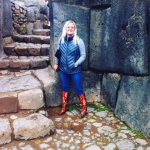
In Thailand, Laos, Myanmar, and Cambodia, Songkran symbolizes new beginnings and the start of a brand new year. It’s a riotous, colorful, fun celebration culminating in a countrywide water fight that spans days and involves locals, expats, and travelers alike.
Videos by TravelAwaits
I spent several years in Thailand and was able to experience Songkran firsthand. If you are heading to the Land of Smiles in mid-April, be prepared to get swept up in the revelry and excitement of this iconic Thai water festival.
Before you grab your water gun and hit the streets of Bangkok, though, there are a few things you should know to make the most of your experience.

1. Prepare For Intense Heat
Songkran falls smack-dab in the middle of April, Thailand’s hottest month. Temperatures regularly exceed 90 degrees, and there’s virtually no reprieve from the sizzling tropical sun. Thailand has three seasons: hot, cool, and wet, and April is the height of the hot season. There is plenty of sun and very little rain during this time, and many people find being outside for long periods extremely uncomfortable.
Although the water wars cool things down, it’s advisable to take precautions if you’ll be outside for long periods of time. Apply sunscreen liberally and regularly, especially if you’re being doused with water. Drink plenty of fresh water, and watch out for signs of sun poisoning.
2. You Will Get Soaked
There’s one cardinal rule of Songkran: Almost everyone is fair game. Since Songkran spans several days, there’s a good chance that you might be ambushed while picking up a coffee or out sightseeing. Certain areas, such as Phuket’s Patong district or Silom Street in Bangkok, have all-out urban warfare complete with hundreds of participants and festivities. Other spots are quieter, but there is no guarantee that you’ll make it through dry.
Songkran is a time to embrace the Thai concept of mai pen rai and adopt a more go-with-the-flow attitude. Resigning yourself to the fact that you might be caught off guard by a cheeky schoolkid with a water gun will prepare you for the inevitable.
3. Getting Drenched Is Considered Lucky
As it turns out, getting drenched is considered lucky in Thailand. Songkran is a time to cleanse oneself of bad luck and start the new year fresh. It’s also a time to celebrate familial bonds and local communities, as well as cherish those who have passed. Songkran marks the transition of the sun from Pisces to Aries, and the hundreds of gallons of water spilled during the festival symbolize renewal.
Getting soaked to the bone during the festivities means that you’ve freed yourself of baggage and are ready to start over with a fresh perspective and clean slate, so if someone dumps a gallon of water over your head, consider it a favor.

4. You Could Be Smeared With White Powder
Din sor pong is a locally produced powder that’s mixed with water and applied to people’s cheeks during Songkran. It’s a limestone clay derivative and generally won’t hurt your skin, but it can stain your clothes. Din sor pong is an important part of the Songkran ritual, but it’s been banned in certain party districts due to instances where it’s been used as a tool of sexual harassment. Check the rules before you hit the streets. You can usually find information online, but there should also be signage in Thai and English in many party districts.
Pure din sor pong is completely harmless, but there have been some instances where people have mixed together crushed chalk and water, which can lead to skin reactions. To be on the safe side, keep din sor pong out of your eyes, and wash your face immediately if you start to experience an adverse reaction.
5. There Are Unspoken Rules
Even boisterous countrywide water wars have rules! Although everyone on the street is technically fair game, you shouldn’t soak the elderly or babies. Never throw water on a monk, and avoid spraying those who are clearly not participating. Some Songkran participants delight in using ice-cold water, but that’s normally frowned upon. Never use water from canals or the ocean, and don’t spray it into people’s faces.
Songkran is a notoriously treacherous time to drive, and the week of the festival is referred to as the Seven Dangerous Days. Don’t splash cars or motorbikes as they are zipping by, even if others are doing so. Drinking and driving spikes during Songkran, and the roads are always wet, so it’s not the best time to practice your motorbike skills. Take rickshaws, public transportation, or walk when you can.
6. Keep Your Valuables Safe
If you want to fully enjoy the festivities without worrying about your electronics short-circuiting, keep your valuables dry and safe during Songkran. You can buy airtight plastic bags at most 7-Elevens, or you can bring sandwich bags from home. Your purse alone won’t protect your phone from the epic water war raging outside. Many people opt to leave their phones at home and only carry what they need for the day.
Don’t wear anything that you don’t want to be soaked and possibly smeared with din sor pong, and consider investing in cheap, rubber flip-flops to navigate the wet streets. Lightweight clothing that dries quickly and protects you from the sun is your best bet.

7. Watch Out For Pickpockets
Unfortunately, Songkran attracts some who are more interested in pilfering than partying. Gangs of pickpockets rely on distraction and massive crowds to make their move. Be a hard target by keeping all of your valuables in zippered pockets or bags on the front of your body. Many stores sell small watertight bags that you can hang around your neck and tuck down the front of your shirt. Pickpockets aren’t looking for a challenge, so take a few simple steps to make yourself a less desirable target.
8. Don’t Miss Out On A Songkran Blessing
These days, Songkran is an excuse to throw a giant party, but the festival actually has deep roots in Buddhism and is a time to get blessings for the upcoming year. Many temples around the country offer visitors the unique option to get a Songkran blessing from the resident monk. You can sprinkle scented water on Buddha statues or pour water on the hands of monks at particular temples. Ask the locals to point you in the right direction. It’s fun to partake in both activities and see the sacred side of Songkran in the morning and the saturated urban jungle in the afternoon. Songkran blessings set you up with good luck for the upcoming year and are an authentic and memorable way to experience Songkran in Thailand.
9. Look Out For Mischievous Elephants
Humans are not the only ones who get in on the Songkran fun. In places like Ayutthaya, elephants participate in the Songkran celebrations as well. Trained elephants are painted and paraded down the streets during the holiday, and sometimes they’ll even engage tourists in friendly water combat. Elephants squirt out water from their noses, dousing the crowd during these planned events.
If you want to go toe-to-toe with an elephant on Songkran, it’s a good idea to arrive early and get a good spot. These events are usually very popular and get crowded quickly. You should also avoid interacting with the elephants or their mahouts. Although the elephants used in Songkran celebrations are trained, they can still be unpredictable.
Experiencing Songkran will be one of the highlights of your trip to Thailand, and the best way to do it is to embrace the water festival with open arms. Follow these tips, and you’ll make the most of your Songkran adventure and have an amazing story to tell when you get back home.
Planning a trip to Thailand? Check out these eight things to know before you go, this guide to cultural etiquette in the country, and this list of the best things to see and do while you’re there.

